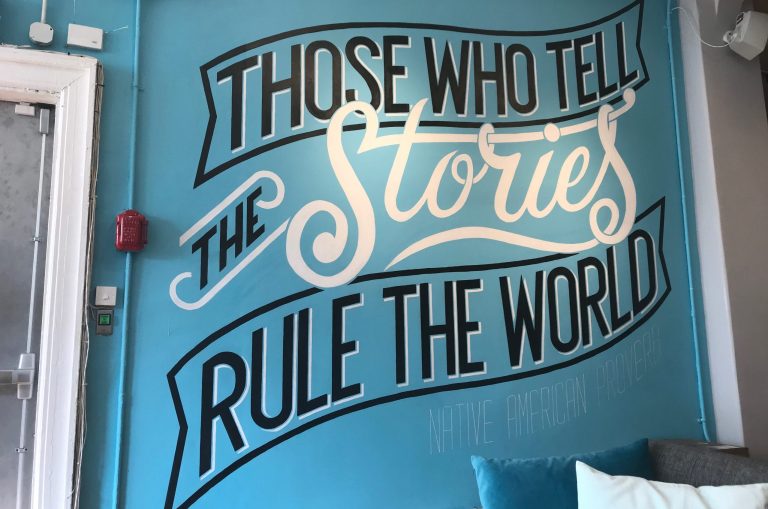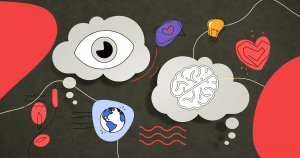May 2018. It’s a warm day in Manhattan, NYC. A glorious spring morning.
A few weeks earlier, I joined a rising Martech startup. My hotel is in Soho. I’m still a bit jet-lagged. Ten minutes walk, and I cross Broadway, near Houston. If asked, I would move to NYC. Even tomorrow.
The office is just around the corner. It’s an old and charming building, right in the middle of that small area, squeezed between the East and the West Villages. So different from the shining glass towers of midtown.
I wait for the elevator, then I go up to the fourth floor. I enter and introduce myself to a few young folks. I’m looking for a few familiar faces.
I’m told to go all the way along the corridor. The marketing team is just around the corner. And then I saw that sentence emblazoned on the wall.
Those who tell the stories rule the world.

It’s a Native American proverb. I’ve used that quote so many times as an introduction for my keynotes. For so many years.
I’m finally in front of that wall. I look around, wait for the corridor to be clear, and then I do what I would never have done in any other situation:
Take a few selfies.

Three years have passed since then — so many changes. We have gone through a global pandemic; actually, we’re still not completely out of it.
I left that company nearly one year ago. Today I work for a new exciting Martech startup. Same category.
Content experiences and storytelling. I’m still fascinated by the power of stories, which is probably the reason why I’ve never left this business category.
What a Story is Not
The intention is not to write about how we can rule the world, but how to be good business storytellers.
I will write about stories, storytelling, business narrative. Salman Rushdie, the famous writer, said: “We are storytelling animals. We are the only creatures on earth that do this unusual thing of telling each other stories in order to understand the kind of the creatures that we are.”
So true. Stories fascinate us. They move, excite, provoke, and entertain us. We continuously look for stories, in good and difficult times. But what exactly is a story? Maybe we should start with what a story is not.
When a child is born, the first things he needs are care, safety, and love. When those things are met, almost the next thing the child asks for is “tell me a story”.
Salman Rushdie
A story is not a process. Like a story, a process has a beginning, a middle, and an end. Unlike a story, a process has neither a desire, a conflict, nor a core character (the hero).
A process accumulates story progress. A story is not a chronology, either. Exec and marketers often think that a story is their company’s history.
The company history is just a temporal process, told as a list of growth marks accumulated over a sequence of dates.
So what’s really a story? Let’s go with a formal definition.
A story is a dynamic escalation of conflict-driven events that cause meaningful change in a character’s life.
Ultimately, storytelling is the art of telling stories, merging and organizing many streams of want into a flow of events that aims at a single object of desire.
Change is Key
Change is the foundation of all stories. Robert McKee, Hollywood screenwriter, and author of the fascinating book Story, says:
“What attracts human attention is change… if the temperature around you changes, if the phone rings — that gets your attention. The way in which a story begins is a starting event that creates a moment of change. “
In a story, if the charge of a value at stake in a situation does not change, what happens is a trivial activity of no significance.
When a value changes from positive to negative or from negative to positive (for instance, from love to hate or hate to love, from winning to losing or losing to winning), the event becomes meaningful, and emotions flow.
Specifically, when the mind’s senses change from negative to positive, it releases pleasure-giving chemicals. If the mind registers a movement from positive to negative, it unleashes a painful flow. Emotion is the side effect of change. Throughout the day, the body absorbs millions of bits of raw, sensory stimuli.
Somewhere below the level of consciousness, the mind sorts through this mass and imposes decision rules that sort the relevant from the irrelevant. It ignores 99% of all data and concentrates on the 1% that grabs attention.
Change.
It’s a Biological Reaction
Since a well-told story wraps its telling around emotionally charged values, its meaning becomes marked in our memory.
When we receive information as a story, rather than as a series of simple facts, our brain activity increases fivefold.
The brain’s parts responsible for emotional reactions, imagining sensations, and visual images all kick in.
We start to care about the story’s main character, and we ask ourselves how we would react if we were in their position. When we get drawn into a story, our brains produce oxytocin, the chemical element that creates empathy.
Oxytocin means we feel connected to the hero in the story. We feel invested in them, we want to help if we can.

This is why the stories of people (or customers) whose lives have been transformed, empowered, or simply improved by our company or organization, are some of the most powerful things we have.
Stories help us connect with our audience, they are memorable, and on a biological level, they make our brains light up, meaning that information is wired in more reliably.
Stories help to create memory structures, which, as we know, are the foundation of all branding-building activities.
This is why we can’t start writing about strategic business narratives if we don’t clarify first why stories and storytelling have a crucial role.
We will analyze — here and in the next episodes — how stories unfold. Be ready to learn more about some stories we’re all familiar with. We will review the typical elements of classic stories, and then we will revert to business.
Content Marketers Take it The Wrong Way
Unfortunately, content folks take it the wrong way when they think about storytelling.
In fact, they consider storytelling as a technique opposed to advertising. Most of the theories behind Content Marketing assume that since buyers hate being interrupted by adverts, the only way to attract them is by using content and stories.
The evidence is clearly different.
Storytelling has always been used by advertising to get brands in the memory of potential buyers.
Advertising uses stories to convey emotions, entertain, inform, and educate.
Stories told through TV commercials are memorable and help brands stick. And if you are familiar with the beautiful TV commercials of John Lewis and Coca-Cola, just to mention a few of them, you know exactly what I’m referring to.

Final Thoughts
Stories have a profound impact on us—they captivate our attention, elicit emotions, and leave lasting impressions. That’s why storytelling plays a crucial role in connecting with our audience and building memorable brand experiences.
If you’re looking to enhance your storytelling efforts and create compelling content that resonates with your customers, WriterAccess can be your valuable partner.
With this content creation platform, you can collaborate with talented writers who specialize in crafting engaging narratives. They have the expertise to bring your brand story to life, evoking emotions and creating a deep connection with your audience.
Whether you need captivating blog posts, compelling videos, or captivating social media campaigns, the writers at WriterAccess can help you achieve your storytelling goals.
By harnessing the power of skilled storytellers, you can ensure that your brand narrative stands out, leaving a lasting impression on your customers.
Don’t underestimate the impact of storytelling on your content marketing strategy. Take a step forward and explore the services offered by WriterAccess to elevate your storytelling game and make your brand truly unforgettable.
End of Episode I.
Next Episode: Campbell, Vogler and the classic Hero Journey








